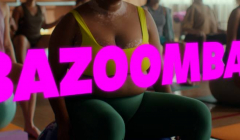
Rexona spot celebrates head to toe sweating
The ‘No more fear of body odour’ campaign from AMVBBDO promotes whole-body deodorant for movement without worry.

From virtual influencers to AI-generated imagery, technology is having a huge impact on the fashion industry.

The controversy over Chinese fast fashion retailer Shein’s use of AI to create clothing designs is the rapid realisation of what many observers feared generative AI could bring - a world where human creativity is replaced by a fake, machine-processed version.
But do the genuine concerns voiced by human designers that Shein is in effect ripping off their work frame all AI-created content as faux, counterfeit creative work that is essentially bad? And does Shein’s approach to AI creativity point to a future where much of the digital and physical marketing content and product design we consume is machine-created?
I would argue that the answer to the first question is no and the answer to the second is potentially yes. If I’m right, it’s worth considering how this might play out in the marketing space and consider some of the challenges and opportunities this creates for brands and agencies.
While the debate about AI and advertising has largely focussed on how humans can use AI tools to enhance ideas and the delivery process as well as programmatic slicing and dicing of creative work to tailor it to audiences, AI will bring more profound changes to the nature of creative work.
With the Cannes Lions International Festival of Creativity launching, a new forum LIONS Creators this year, recognising that influencers are playing an increasingly important role in marketing, it’s worth considering how AI could change what they produce.
Faux or virtual influencers are already an established part of the influencer universe, top examples include Lu do Magalu, Lil Miquela, Barbie and Guggimon. Beyond these virtual influencers, a new realm of licenced AI-generated content to create digital avatars derived from real humans is on the cusp of challenging our views of whether machine creativity is genuine and of worth.
Influencers are playing an increasingly important role in marketing, it’s worth considering how AI could change what they produce.
Majid Bahi, Global CEO, Socially Powerful
The first scenario influencers and in turn brands and agencies will need to consider is AI-generated content using the images of real influencers. In effect using AI to create a stream of new content using the influencer’s licenced image and intellectual property.
Actual, filmed content featuring the flesh and blood version of influencers in action will need to be delineated from their virtual versions, but this AI created version could be licenced for use by brands.
Licenced AI-generated human influencer imagery will likely land somewhere in between true human influencer content and pure virtual influencers in terms of effectiveness and cost.
But will consumers mind watching the stuff from human influencers that is machine generated? Will they come to value this as much as the material that is hand created? Since all of it will be based on the original influencer’s personality, tastes, views, quirks and foibles, it may well be that over time they come to see little difference.
The concept opens up questions for influencers as well as brands. How comfortable will influencers be with licencing not just their image, but their personality traits and other qualities. How will this be defined and licenced? How should brands use them?
As we’ve seen with the launch of Tik Tok’s ‘stock avatars’ and ‘creative avatars’, AI will enable influencers and creators to scale and globalise branded content in a personalised way, through perceived human gestures, expressions and language. Just like advertising creatives, influencers will be able to use AI to generate content themes and specific scenarios – recipes, health routines, style formulas, exercise regimes, to fuel their output. Although human judgement will remain the ultimate editor of what is used.
This advancement of generative AI means influencers can become multi-lingual with the ability to scale their global reach, opening up more brand collaborations which can be localised to create more impactful campaigns.
However, the implications for AI and creativity go further into the realm of consumer relationship-building. Advancing generative AI offers influencers the opportunity to clone themselves into human-branded chatbots, becoming in effect ever-present virtual friends and lifestyle companions or advisors.
This offers another means through-which influencers can monetise their audiences through subscriptions or on a pay-per-interaction basis. It offers brands the potential to buy the licensed clone and fuse influencer-based marketing with customer experience strategy across all brand touch points.
The growth of virtual influencers suggests the market for licenced AI-versions of real influencers could be huge. But the concept will challenge influencers, marketers and agencies on a philosophical as well as at a creative level.
Majid is CEO of global social-first marketing agency Socially Powerful. With a passion for innovation and an entrepreneurial spirit, Majid embarked on a journey to establish the agency from scratch, building its diverse capabilities from strategy and planning to creative execution. Under Majid's leadership, the agency has transformed into an industry's leading social-first full-service creative powerhouse. Driven by a deep-rooted belief in the positive potential of social and influencer marketing, Majid is passionate about utilising these tools for the greater good. Majid also actively engages in strategy advisory projects and spearheads social media strategy refresh initiatives.
Looks like you need to create a Creativebrief account to perform this action.
Create account Sign inLooks like you need to create a Creativebrief account to perform this action.
Create account Sign in